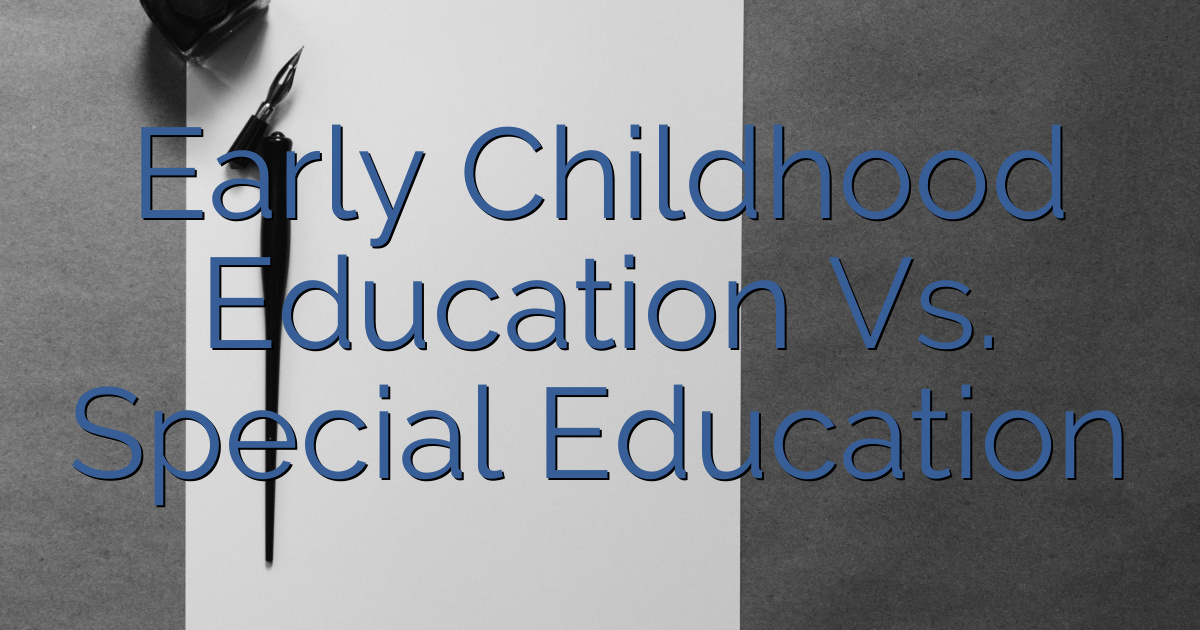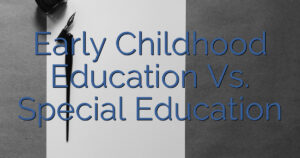 Do you ever wonder about the differences between Early Childhood Education and Special Education? Well, get ready to dive into the fascinating world of these two majors.
In this article, we will provide you with an overview of the curriculum, coursework, and teaching methods, as well as a comparison of the skills developed and career opportunities.
By the end, you’ll have a clearer picture of which path might be the right fit for you. So, let’s get started!
Do you ever wonder about the differences between Early Childhood Education and Special Education? Well, get ready to dive into the fascinating world of these two majors.
In this article, we will provide you with an overview of the curriculum, coursework, and teaching methods, as well as a comparison of the skills developed and career opportunities.
By the end, you’ll have a clearer picture of which path might be the right fit for you. So, let’s get started!
Table of Contents
Key Takeaways – Early Childhood Education Vs. Special Education
- Early Childhood Education focuses on the growth and development of young children, while Special Education makes a significant impact on children with disabilities.
- Both majors contribute to the holistic development of children, with Early Childhood Education providing a strong foundation for cognitive, social, and emotional development, and Special Education addressing specific needs and promoting inclusive learning environments.
- The curriculum and requirements for Early Childhood Education emphasize general education for young children, including courses on child psychology and early literacy development. On the other hand, Special Education focuses on teaching students with disabilities and includes courses on special education laws and individualized education plans (IEPs).
- Both majors develop strong communication and interpersonal skills, with Early Childhood Education fostering language development and effective communication, and Special Education supporting students with communication disorders. Additionally, both majors enhance social development and facilitate social interactions.
Overview of the two majors: Early Childhood Education and Special Education
Both Early Childhood Education and Special Education majors involve working with children. When it comes to job satisfaction, there are some differences between the two. In Early Childhood Education, job satisfaction often comes from witnessing the growth and development of young children, as well as the joy of helping them learn and explore. Special Education, on the other hand, offers a unique kind of satisfaction. Special Education teachers have the opportunity to make a significant impact on children with disabilities, helping them overcome challenges and achieve their full potential. In terms of impact on children’s development, both majors play crucial roles. Early Childhood Education focuses on providing a strong foundation for cognitive, social, and emotional development, while Special Education focuses on addressing specific needs and promoting inclusive learning environments. Both majors contribute to the holistic development of children, but in different ways.Overview of the curriculum and requirements of the two majors
The curriculum and requirements of these two majors differ significantly. In Early Childhood Education, you will study a wide range of subjects including child development, curriculum planning, and assessment methods. Special Education, on the other hand, focuses more on teaching students with disabilities and helping them overcome barriers to learning. Here are some key differences between the two majors:- Early Childhood Education:
- Emphasizes general education for young children.
- Includes courses on child psychology and early literacy development.
- Assessment methods focus on observing and documenting children’s progress.
- Field experience opportunities may include working in preschools or daycare centers.
- Graduates often pursue careers as preschool teachers or child care administrators.
- Special Education:
- Focuses on teaching students with disabilities.
- Includes courses on special education laws and individualized education plans (IEPs).
- Assessment methods involve evaluating students’ abilities and designing appropriate interventions.
- Field experience opportunities may include working in special education classrooms or therapy centers.
- Graduates often work as special education teachers or educational consultants.
Overview of coursework, assessments, and teaching methods
To succeed in your coursework and assessments, you’ll need to familiarize yourself with various teaching methods in both the early childhood education and special education majors. Both majors offer a range of coursework options that focus on the development and education of young children. In early childhood education, you’ll explore subjects such as child development, curriculum planning, and classroom management. In special education, your coursework will cover topics like inclusive education, behavior management, and individualized instruction. When it comes to teaching strategies, early childhood education emphasizes play-based and hands-on approaches to learning, while special education focuses on individualized instruction and accommodations for students with disabilities. Understanding and implementing these teaching strategies will help you effectively engage and support your students in both majors.Comparison of Skills Developed: Communication and Interpersonal Skills
As a student in the early childhood and special education majors, you’ll develop strong communication and interpersonal skills that will enable you to effectively connect with and support your students. Communication skills are crucial in both fields, allowing you to effectively convey information, understand the needs of your students, and collaborate with other professionals and parents. In early childhood education, you’ll focus on fostering language development and promoting effective communication through various activities such as storytelling and group discussions. In special education, you’ll learn strategies to support students with communication disorders, such as using augmentative and alternative communication systems. Additionally, both majors emphasize the importance of social development and provide opportunities to enhance your skills in facilitating social interactions and promoting positive relationships among students.| Early Childhood Education | Special Education |
|---|---|
| Fostering language development | Supporting students with communication disorders |
| Promoting effective communication | Using augmentative and alternative communication systems |
| Enhancing social development | Facilitating social interactions among students |
Comparison of Career Opportunities and Job Roles: Early Childhood Education Vs. Special Education Vs. Elementary Education
If you’re interested in pursuing a career in teaching, you’ll find various job opportunities and roles in early childhood education, special education, and elementary education. Each field offers unique aspects and challenges, catering to different needs and abilities of students. In early childhood education, you can work as a preschool teacher or a daycare provider, nurturing and guiding young minds during their formative years. Special education offers a chance to work with students who have disabilities, providing individualized support and helping them reach their full potential. In elementary education, you can teach a specific subject or become a general classroom teacher, shaping the academic and social development of children. Each career path requires specialized skills and knowledge, but all share the common goal of making a positive impact on students’ lives.Comparison of Salary Potential: Job Market Analysis
When considering a career in teaching, it is important to explore the salary potential and job market analysis of different fields. You’ll want to look into areas such as early childhood, special education, and elementary education. Understanding the financial aspect of teaching is crucial, but so is recognizing the impact you can have on students’ lives. Here are some key points to consider:- Early Childhood Education:
- Average salary: $30,000 to $50,000 per year
- Job market analysis: Growing demand for qualified early childhood educators due to increased awareness of the importance of early education
- Special Education:
- Average salary: $45,000 to $65,000 per year
- Job market analysis: High demand for special education teachers due to the increasing number of students with disabilities
Similarities between Early Childhood Education and Special Education Careers
Now that we have discussed the salary potential and job market analysis for both early childhood education and special education careers, let’s explore the similarities between these two fields. Despite their differences, there are several key similarities that can be found in both early childhood education and special education.| Similarities | Early Childhood Education | Special Education |
|---|---|---|
| 1. Focus on Education | Both careers center around educating and supporting students. | Both careers involve teaching and assisting students with special needs. |
| 2. Impact on Students | Both careers have the potential to positively impact the lives of students. | Both careers aim to provide students with the necessary skills and support to succeed academically and socially. |
| 3. Collaboration | Both careers require collaboration with other professionals, such as parents, therapists, and administrators. | Both careers involve working closely with parents, therapists, and other professionals to create individualized education plans for students. |
| 4. Job Prospects | Both careers have promising job prospects, with a growing demand for qualified professionals. | Both careers offer a range of job opportunities in various educational settings, including public and private schools, as well as specialized programs. |
Difference between Early Childhood Education and Special Education majors
To understand the difference between the two majors, you should consider the specific focus and coursework of each program. In early childhood education, the main focus is on the development and education of children from birth to age 8. The coursework typically covers child psychology, curriculum development, and classroom management. Graduates of this program often work as preschool teachers, kindergarten teachers, or child care center directors. On the other hand, special education majors focus on providing support and education to students with disabilities. The coursework includes topics such as learning disabilities, behavior management, and individualized education programs. Special education graduates can pursue careers as special education teachers, behavior analysts, or educational consultants. In terms of field experience requirements, both majors require students to complete supervised practicum or internship hours in educational settings. However, the specific requirements may vary between programs and institutions. Overall, while both majors involve working with children, early childhood education focuses on the general education of young children, while special education majors address the needs of students with disabilities.Factors to consider when choosing between the two majors: interests
One important factor to consider when choosing between the two majors is your personal interests. Both early childhood education and special education have their own unique aspects and career opportunities. Here are three key factors to consider when making your decision:- Special education vs. general education: Determine whether you are more interested in working with students who have specific learning needs or with a broader range of students in a general education setting.
- Early intervention programs: Consider if you have a passion for early childhood development and want to make a difference in the lives of young children by providing them with the necessary support and interventions to succeed.
- Importance of inclusion in education: Reflect on your belief in creating inclusive classrooms where students of all abilities can learn together. Consider if you are committed to advocating for equal opportunities and ensuring that every child receives a quality education.
How Does a Degree in Sports Management Compare to a Degree in Early Childhood Education or Special Education?
A degree in sports management offers diverse sports management career paths, including opportunities in professional sports organizations, collegiate athletics departments, and sports marketing firms. In comparison, a degree in early childhood education or special education leads to fulfilling careers in teaching and supporting young children with diverse learning needs.

